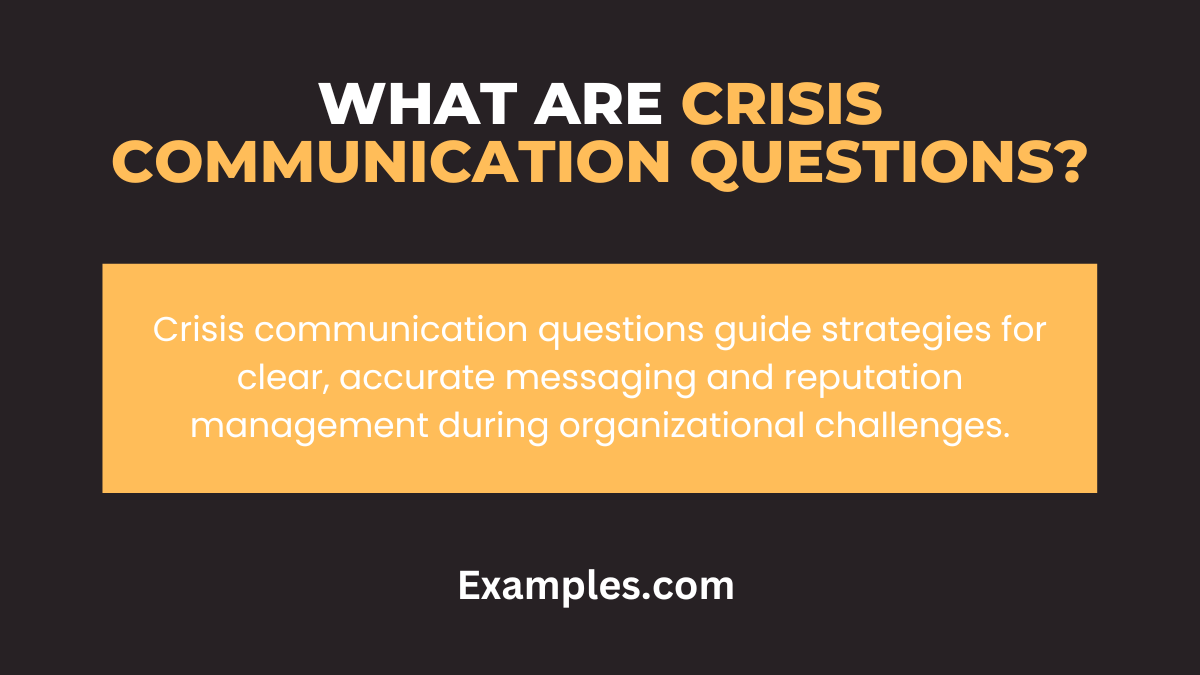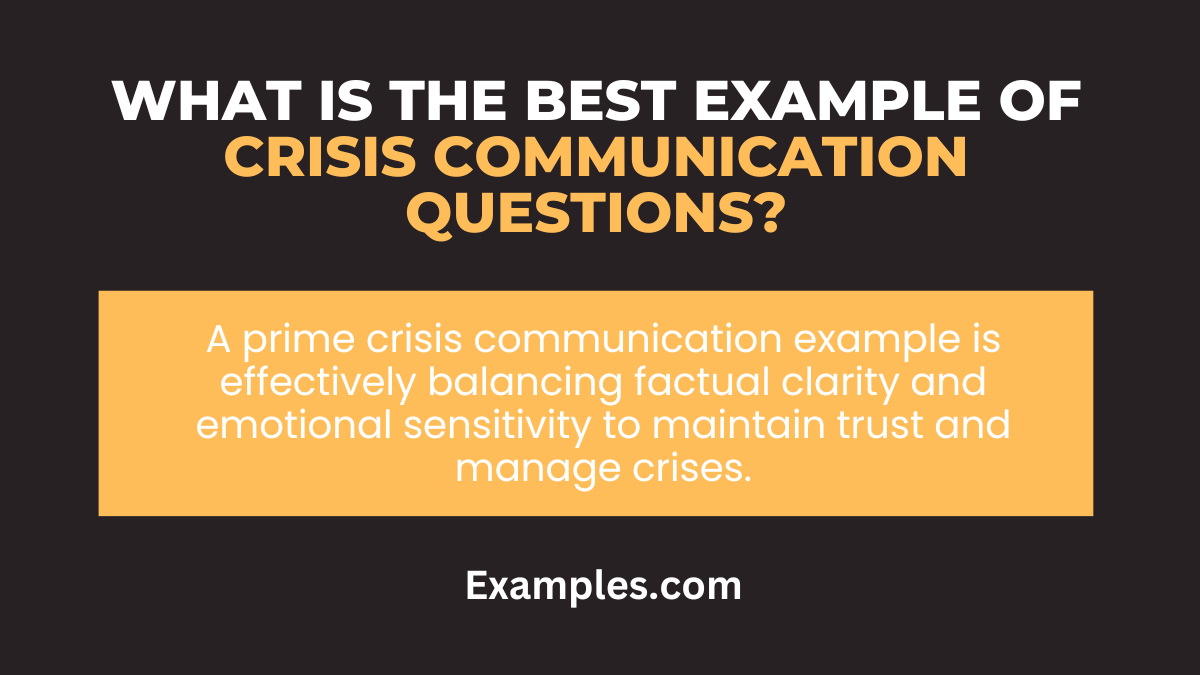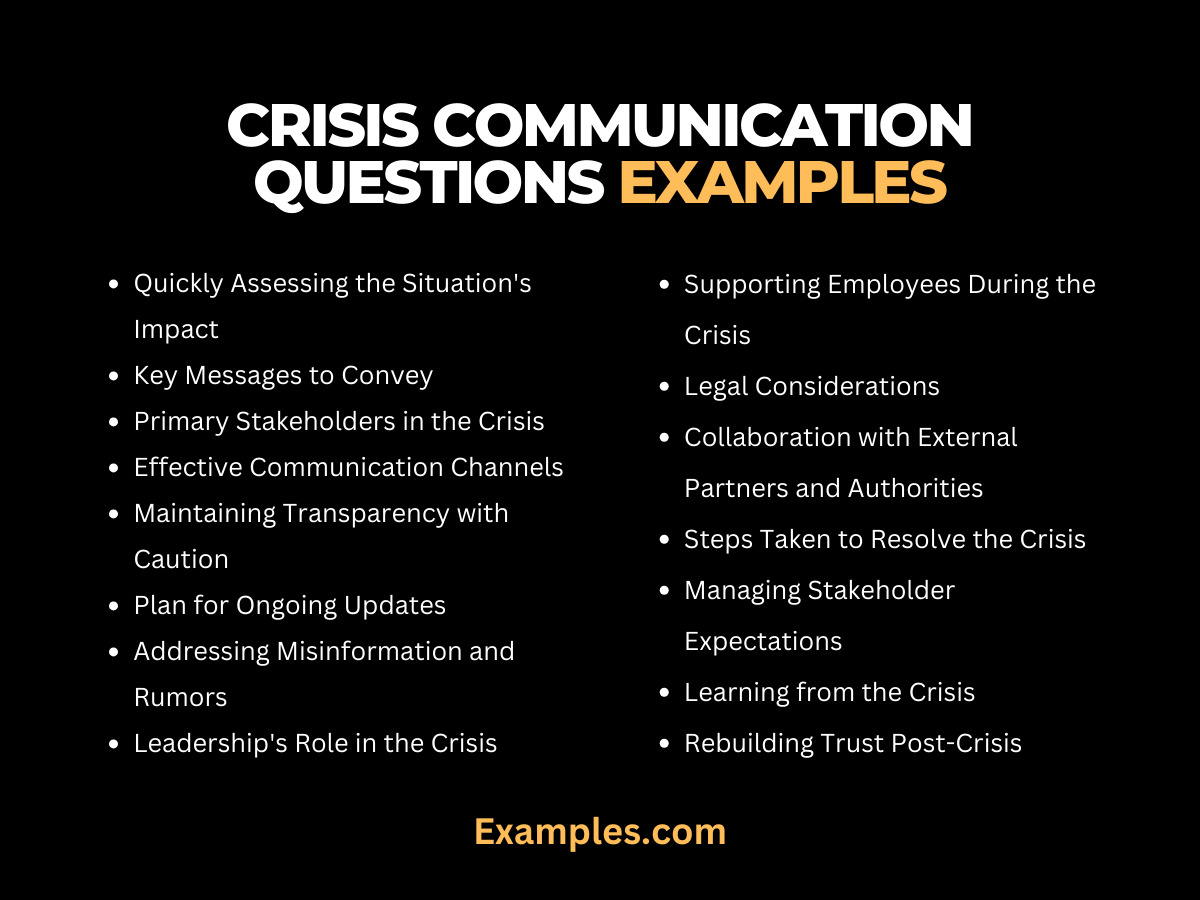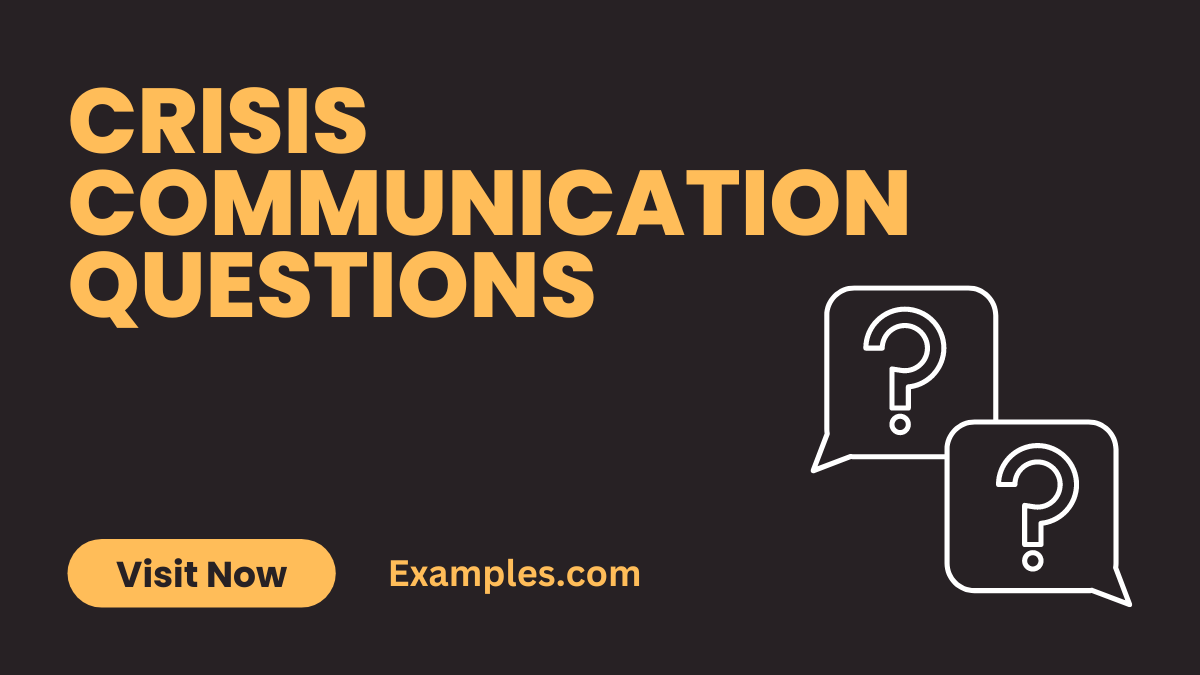14+ Crisis Communication Question Examples
In the ever-evolving landscape of business and public relations, understanding and mastering crisis communication is crucial. This comprehensive guide illuminates the intricate world of Crisis Communication Questions, offering practical examples and insights. Delve into strategies that help you stay ahead during turbulent times, ensuring your message is clear, empathetic, and effective. Whether you’re a seasoned professional or new to the field, this guide provides invaluable tools to tackle crises with confidence.
What are Crisis Communication Questions?

Crisis communication questions are pivotal inquiries used during challenging or unforeseen situations that a company or organization faces. These questions are designed to guide the communication strategy, ensuring that messages conveyed are clear, accurate, and effective. They play a crucial role in managing information dissemination, stakeholder engagement, and maintaining the organization’s reputation during a crisis.
What is the Best Example of Crisis Communication Questions?

A prime example of a crisis communication question is, “How do we accurately and empathically communicate the situation to our stakeholders while minimizing panic and misinformation?” This question highlights the dual necessity of factual clarity and emotional sensitivity, which are essential in maintaining trust and managing the crisis effectively. It encompasses understanding the crisis’s scope, the stakeholders’ concerns, and the most appropriate channels for communication.
15 Crisis Communication Questions Examples

- How can we quickly assess the situation’s impact: Determine the extent of the crisis and plan accordingly.
Example: “What are the immediate effects of this crisis on our operations and stakeholders?” - What are the key messages we need to convey: Identify essential information to share with stakeholders.
Example: “Our top priority is ensuring the safety and well-being of everyone involved.” - Who are our primary stakeholders in this crisis: Recognize the affected parties to tailor your communication.
Example: “We need to address our customers, employees, and local communities first.” - What channels are most effective for our communication: Choose the right platforms for disseminating information.
Example: “Let’s use social media and press releases for broad and immediate reach.” - How do we maintain transparency while being cautious: Balance openness with the need to protect sensitive details.
Example: “We are committed to keeping you informed with all the information we can share at this moment.” - What is our plan for ongoing updates: Develop a strategy for continuous communication.
Example: “We will provide daily updates at 10 AM through our official channels.” - How do we address misinformation or rumors: Tackle false information effectively and promptly.
Example: “We urge everyone to rely on official statements for accurate information.” - What role does leadership play in this crisis: Define how leaders will guide the crisis response.
Example: “Our leadership team is actively involved in managing the situation and will be the face of our communication.” - How can we support our employees during this time: Focus on the well-being of your staff.
Example: “We are setting up a support hotline for our employees to address their concerns and needs.” - What legal considerations must we keep in mind: Address potential legal implications of the crisis.
Example: “We must consult with our legal team to ensure compliance and mitigate legal risks.” - How can we work with external partners and authorities: Coordinate with outside entities for a united response.
Example: “Let’s collaborate with local authorities and experts for a comprehensive action plan.” - What steps are we taking to resolve the crisis: Communicate the actions being taken.
Example: “We have implemented immediate measures to address the issue and prevent future occurrences.” - How do we manage stakeholder expectations: Set realistic expectations about the crisis resolution.
Example: “We are working tirelessly to resolve this matter, though it may take some time to fully rectify the situation.” - What lessons can we learn from this crisis: Reflect on the experience for future improvement.
Example: “We will review our response to this crisis to enhance our future preparedness.” - How do we rebuild trust post-crisis: Plan for restoring confidence and relationships.
Example: “Our commitment to transparency and improvement will guide our efforts to rebuild trust with all stakeholders.”
Crisis Communication Question Examples in Interview
- How would you prioritize communication tasks during a crisis? Assess the candidate’s ability to manage multiple aspects of communication. Example: “I would first address the most urgent issues, ensuring clear and timely updates to key stakeholders.”
- Can you give an example of a difficult crisis you managed? Evaluate experience and problem-solving skills. Example: “In my previous role, I successfully navigated a product recall by implementing a transparent and proactive communication plan.”
- How do you handle conflicting information in a crisis? Understand the approach to managing misinformation. Example: “I verify facts from multiple sources before disseminating any information to avoid confusion.”
- Describe a time when you had to communicate bad news. Gauge the ability to handle sensitive communication. Example: “I had to inform the team about budget cuts, focusing on the reasons and future steps to mitigate impact.”
- What strategies do you use to remain calm under pressure? Assess personal coping mechanisms in stressful situations. Example: “I focus on structured problem-solving and deep breathing to maintain composure during a crisis.”
Crisis Communication Question Examples for Business
- How do we communicate our crisis response plan to employees? Focus on internal communication strategies. Example: “We’ll use internal newsletters and meetings to ensure every team member understands our crisis response strategy.”
- What steps should we take to protect our brand image during a crisis? Explore brand management in adverse situations. Example: “Immediate, transparent, and consistent communication is key to protecting our brand’s integrity.”
- How can we use social media effectively during a crisis? Leverage digital platforms for crisis management. Example: “We’ll use social media for real-time updates and to address customer concerns directly.”
- What are the best practices for communicating with regulators during a crisis? Address compliance and legal aspects. Example: “It’s crucial to provide accurate and timely information to regulators to maintain compliance.”
- How do we manage customer expectations during a service disruption? Ensure customer satisfaction in challenging times. Example: “We will communicate proactively with customers about the issue and expected resolution times.”
What Questions Should Be Asked in Crisis Communication?
In the realm of crisis communication, asking the right questions is pivotal for effective management and resolution. These questions not only guide the communication strategy but also ensure that all aspects of the crisis are addressed comprehensively and empathetically. When dealing with a crisis, it’s essential to inquire about the immediate and long-term impacts. Questions like “What are the immediate risks associated with this crisis?” and “How will this crisis affect our long-term goals?” are crucial. These inquiries help in assessing the situation from both a short-term and a strategic viewpoint. Additionally, understanding the stakeholders’ perspectives is vital. Questions such as “Who are our key stakeholders in this crisis?” and “How will this crisis impact our stakeholders?” enable a more targeted and effective communication approach. By focusing on these aspects, organizations can ensure that their crisis communication strategies are not only reactive but also proactive in managing and mitigating the impact of the crisis.
What are the Crisis Communication Strategies?
Developing robust crisis communication strategies is essential for any organization to navigate through challenging times effectively. The cornerstone of these strategies is transparent and timely communication. It involves keeping all stakeholders, including employees, customers, and the public, informed with accurate and updated information. A critical aspect of this strategy is the use of diverse communication channels to reach different audiences. For instance, social media might be ideal for reaching a broad audience quickly, while targeted emails may be more appropriate for detailed communication with employees or specific stakeholder groups. Another key element is empathy in communication. This involves acknowledging the concerns and emotions of the affected parties, demonstrating that the organization is not just addressing the crisis mechanically but is also considerate of its human impact. Incorporating empathy and transparency into crisis communication helps in maintaining trust and credibility, which are crucial for managing the situation effectively and ensuring a smoother recovery post-crisis.
In conclusion, mastering Crisis Communication Questions is vital for effective crisis management. This guide provides comprehensive insights and practical examples, equipping professionals with the necessary tools and strategies. By understanding and applying these concepts, organizations can navigate crises with confidence, maintain stakeholder trust, and emerge stronger from challenging situations.



